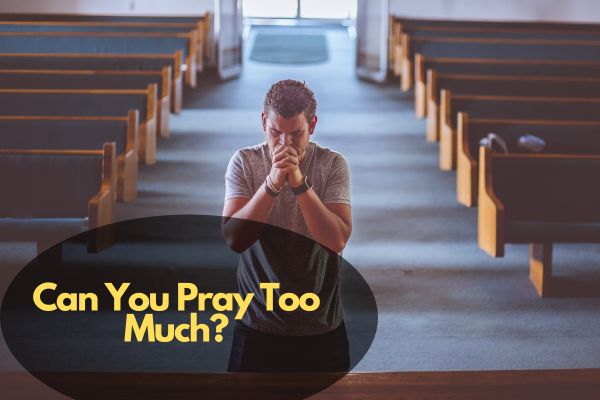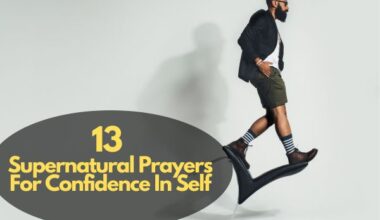Table of Contents Show
Prayer, an age-old practice embedded in various cultures and spiritual traditions, has long been regarded as a powerful tool for spiritual growth and self-reflection. While it serves as a source of solace and guidance for many, there have been debates about the possibility of excess in this sacred practice. Can You Pray Too Much?
This question has stirred contemplation among believers and skeptics alike, urging us to plunge deeper into the intricacies of spiritual devotion and its potential implications on one’s well-being.
Can You Pray Too Much?
Prayer is a sacred practice that holds a significant place in various religious traditions and spiritual philosophies. It serves as a means of communication with the divine, offering solace, guidance, and strength to countless individuals worldwide.
In some cases, excessive praying might stem from a deep spiritual yearning or an emotional struggle. This intense desire to seek divine intervention can lead to repetitive and compulsive prayer rituals. While the intention behind such acts might be pure, the consequences can sometimes be counterproductive. Excessive prayer might lead to feelings of guilt, anxiety, or even a sense of spiritual inadequacy.
The Nature of Prayer
In its essence, prayer serves as a medium for individuals to communicate with a higher power, seek guidance, and solace, or express gratitude. The act of prayer is deeply rooted in the belief that it fosters a connection with the divine and offers a sense of spiritual fulfillment.
Balancing Devotion
Maintaining equilibrium in spiritual practice involves a delicate balance between one’s dedication to prayer and other aspects of life. It is essential to understand the need for moderation in one’s devotional practices to ensure a holistic approach to spiritual growth.
Potential Overemphasis
While prayer is often perceived as a means to find solace and guidance, an excessive focus on prayer might raise concerns about potential adverse effects on mental and physical well-being. It is crucial to explore the boundaries of devotion and understand the implications of an overly intense prayer routine.
Mental and Emotional Well-being
Studies have suggested that prayer can positively impact mental health by reducing stress and fostering a sense of peace and tranquility. However, an excessive preoccupation with prayer might lead to heightened anxiety or a sense of guilt, demanding a closer examination of the psychological impact of prolonged or intense prayer practices.
Physical Health
The interconnection between mind and body implies that prayer can also affect physical well-being. While moderate prayer has been linked to better stress management and overall health, an excessive focus on prayer may result in neglecting physical health, leading to potential imbalances in one’s overall well-being.
Impact on Daily Life
Integrating prayer seamlessly into daily activities can enhance one’s spiritual experience and provide a sense of continuity between spiritual and worldly pursuits. However, an excessive preoccupation with prayer might disrupt daily routines, leading to potential conflicts between spiritual practice and practical responsibilities.
Overcoming Guilt
Those who indulge in intense prayer sessions may sometimes experience feelings of guilt or inadequacy if they believe they are not dedicating enough time to their spiritual practice. Overcoming such guilt requires a nuanced understanding of the principles of self-compassion and self-acceptance within the realm of spiritual devotion.
Cultivating Spiritual Growth
Striking a balance between intensive prayer and personal growth involves understanding the dynamic nature of spirituality and the need for holistic development. This necessitates a multifaceted approach that combines prayer with introspection, action, and personal development.
Perspectives from Spiritual Leaders
Prominent spiritual leaders and scholars offer valuable insights into the nuances of excessive prayer and its impact on individuals’ spiritual journeys. Their perspectives shed light on the importance of balance, self-awareness, and mindfulness in spiritual practices.
Prayer as a form of spiritual growth
When approached with a balanced mindset, prayer can serve as a catalyst for spiritual growth, fostering a deeper sense of connection and understanding of one’s spiritual beliefs. It enables individuals to embark on a journey of self-discovery and introspection, leading to personal enlightenment and a heightened sense of purpose.
Balancing prayer with other activities
Maintaining a healthy equilibrium between prayer and other daily activities is essential in leading a well-rounded life. Integrating prayer into a structured daily routine that includes work, recreation, and social engagement fosters a sense of balance and fulfillment, preventing the adverse effects of an excessive preoccupation with spiritual practices.
Recognizing signs of an unhealthy prayer obsession
Acknowledging the signs of an unhealthy prayer obsession is crucial in promoting self-awareness and seeking appropriate guidance. Overwhelming feelings of guilt, anxiety, or neglect of personal responsibilities may indicate the need to reassess one’s approach to prayer and seek support from trusted spiritual mentors or mental health professionals.
Creating a Personal Prayer Practice
Developing a personalized prayer routine tailored to one’s spiritual inclinations and personal preferences can foster a deeper connection with the divine. A customized approach to prayer allows individuals to establish a meaningful and sustainable practice that resonates with their beliefs and values.
Community and Social Impact
In addition to its personal significance, prayer can also play a pivotal role in fostering communal harmony and social well-being. Collective prayers and spiritual gatherings have the potential to create a sense of unity and shared purpose, contributing to the overall social fabric.
Real-life testimonies and experiences
Sharing real-life testimonies and experiences of individuals who have struggled with excessive prayer offers a relatable perspective, fostering empathy and understanding within the readership. These narratives serve as a source of inspiration and guidance, emphasizing the importance of self-reflection and the pursuit of a balanced spiritual lifestyle.
Importance of self-care and moderation in religious practices
In the pursuit of spiritual growth and devotion, prioritizing self-care and moderation is paramount. Nurturing one’s emotional, physical, and mental well-being enhances the overall experience of prayer, promoting a holistic approach that integrates spiritual nourishment with personal fulfillment and contentment.
Conclusion
In essence, prayer, when practiced in moderation and with genuine intention, can serve as a source of comfort, guidance, and spiritual growth. However, an excessive preoccupation with prayer can potentially lead to psychological distress and hinder personal growth. By embracing a balanced approach to prayer, individuals can foster a harmonious relationship with their spiritual beliefs while prioritizing their overall well-being and contributing positively to their communities and relationships
FAQs
Can excessive prayer lead to mental health issues?
Excessive prayer may lead to heightened anxiety and guilt, potentially contributing to mental health concerns. It is crucial to maintain a healthy balance between spiritual practice and psychological well-being.
How can one differentiate between healthy devotion and excessive prayer?
The key lies in maintaining awareness of one’s emotional and physical well-being. If prayer starts to dominate all aspects of life, causing distress or neglecting other responsibilities, it might be a sign of excessive devotion.
Are there any specific guidelines for creating a balanced prayer routine?
While there are no strict rules, it is advisable to include other aspects of personal development, such as physical exercise, social interactions, and recreational activities, alongside prayer for a well-rounded spiritual practice.








